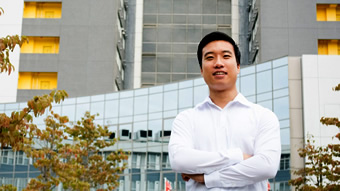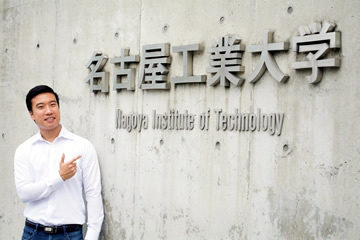Mr. Sirawit Wongvitavas (Thailand)
PERSON
This corner focuses on a person who has made remarkable achievements at NITech.
October,2016
Mr. Sirawit Wongvitavas (Thailand)
Department of Scientific and Engineering Simulation of Graduate School of Engineering
Fluid Science Laboratory (Prof. Toshiyuki Gotoh)

First of all, I would like to thanks for giving me an opportunity to write an article on NITech webpage. I am currently a 2nd year Master's Degree student in Fluid Science Laboratory under Professor Toshiyuki Gotoh in the Department of Scientific and Engineering Simulation. My field of study is Computation Applied Science which involves numerical approaches for a wide range of engineering phenomena. This includes learning advanced mathematics and physics to model those phenomena, and studying numerical algorithms for accurate and efficient computations, techniques of large-scale simulation, and huge data visualization suited to supercomputers and grid-computation environment. My current research is Numerical simulation of flow around a circular cylinder using Marker-and-Cells (MAC) method.
I graduated with a Bachelor Degree in Mechanical Engineering with First Class Honours from the University of Southampton, UK. My opportunity of coming to Japan came when I was informed by one of my lecturer, Dr Dina Laila, about the 2 years Master program, "International Graduate Program for Global Engineers (IGPGE)", sponsored by Japanese Government (MEXT Scholarship). It is a special program for International students from Asian countries aims at developing skilled engineers who could contribute to the Japanese industry society or as a liaison with their home countries. The program is managed by the cooperation of some manufacturing companies in the region. It is a program which has excellent prospect in both industrial and research, and hence, I chose to apply for it.
I arrived in Japan in October, 2015, which was my first time in Japan. Although I have been living abroad since the age of 15, where I started my high school in New Zealand, it was still very challenging as I had to learn a new language from the beginning again, as well as the new culture norms. Having the three hours daily intensive Japanese language classes as part of the program was very helpful. Japan is nowhere similar to other countries I had lived in (Thailand, New Zealand, India, United Kingdom), with its rich in culture and the unique etiquette & manners. There are many words I can think of to express how I perceive Japan; polite, punctual, kind, hard-working, respectful, and intelligent. Japanese people are very delicate and caring about others. I can grasp their sincereness through action and behavior rather than words. Knowing these little actions and manners can be adapted to anywhere in the world, considering that action is a universal way to convey goodwill for someone.

During my one year in Japan, I had fortunes to visit many factories in various industries. Japan is well known for its high quality goods from the manufacturing sector which is responsible for 90% of Japan's export. Having opportunities to visit factories of leading companies in the field such as Toyota, Mazda, Aichi Kikai (Nissan engines supplier), etc., was something very exclusive and beneficial for me. One of the similarities between these factories is that they all implement Kaizen, which refers to "continuous improvement" and is the core of Japanese manufacturing industry. I also got to learn more about that later during my internship at Kubota Corporation, where I got insights into engines mechanical systems and its production for 4 weeks in the factory. In addition, the program provides a course called "工場長養成塾" (koujouchou-youseijuku(JPN)), where students can participate in factories of many medium size companies to observe and suggest Kaizen points that can be implemented.
In the future, potentially, I would like to work in an automotive industry or heavy industry. I had a chance to get involved in this field since my 2nd year where I engaged in an electric bus project, sponsored by Indian Institute of Technology (IIT) Bombay. And working experience in a British company specialised in hybrid powertrain technologies, Controlled Power Technologies, before coming to Japan. Although I am still uncertain whether I should enter into the field of production or utilize my master degree in the field of research and design; I always seek to acquire the knowledge in my lacking area as it will broaden my prospect and perspective.
For the students who are considering joining Nagoya Institute of Technology, I would strongly recommend this university and its programs. You never know your potential until you grab the chance and leave your comfort zone. NITech is an excellent platform to shape your future regardless of where you want to work in this world.

 Japanese
Japanese